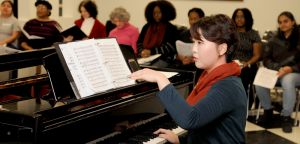
The concentration in Music Education prepares students to teach through an integrated sequence of music and academic courses, development of music skills, and pre-service internship. Coursework in applied music, conducting, theory, history, keyboard, instrumental and vocal pedagogy, and music education form a comprehensive program that emphasizes musicianship, interpersonal skills and teaching proficiency.
The pillars of the Teacher Preparation Program are solid knowledge of a discipline and practical experience. The program seeks to develop pre-service teachers who are:
- competent, caring, reflective, and qualified educators;
- well prepared in their subject knowledge;
- able to implement “best teaching practices” in their instruction;
- proficient readers, writers, listeners, and able to model expertise in these fundamental aspects of educational practice;
- knowledgeable about the impact of technology on education and how to use technology in an effective manner; and
- well-grounded in the appreciation of diversity and global cultures
As scholarship and performance are not mutually exclusive, all music majors are required to declare and study a major instrument, and perform two jury reviews every year. Students are encouraged to take part in the diverse performance opportunities available to enrich their understanding of the music they are studying.
For information about the Music Education concentration, contact Prof. Mark Zaki.
B.A. Course requirements
Music Major Requirements (minimum 48 credits)
Upon admittance to the school, incoming freshman and transfer student music majors should contact the music program coordinator for information on placement exams and audition dates: Prof. Mark Zaki or call (856) 225-6539. Students majoring in music must earn a grade of C or better in the following courses:
MUSIC CORE REQUIREMENTS (23 CREDITS)
- 50:700:161-162 Musicianship I, II (2, 2)
- 50:700:205-206 Musicianship III, IV (2, 2)
- 50:700:225-226 Music Theory I, II (3, 3)
- 50:700:271 Music Technology I (3)
- 50:700:291,292 History of Music I, II (3, 3)
All students in the Theories and Histories and Music and Technology pathways will complete and publicly present a capstone project in their final year. This project will be under the supervision of a full-time faculty member with expertise in the student’s area of interest.
Performance (10 credits)
A minimum of four semesters of applied music on primary instrument or voice (1,1,1,1)
B.A. DEGREE REQUIREMENTS
MUSIC MAJOR REQUIREMENTS (MINIMUM 48 CREDITS)
Upon admittance to the school, incoming freshman and transfer student music majors should contact the music program coordinator for information on placement exam and audition dates: Prof. Mark Zaki or call (856) 225-6539.
Students majoring in music must earn a grade of C or better in the following courses:
MUSIC CORE REQUIREMENTS (23 CREDITS)
- 50:700:161-162 Musicianship I, II (2, 2)
- 50:700:205-206 Musicianship III, IV (2, 2)
- 50:700:225-226 Music Theory I, II (3, 3)
- 50:700:301 Sound Thinking (3)
- 50:700:291,292 History of Music I, II (3, 3)
All students in the Theories and Histories and Music and Technology pathways will complete and publicly present a capstone project in their final year. This project will be under the supervision of a full-time faculty member with expertise in the student’s area of interest. Performance (10 credits) A minimum of four semesters of applied music on primary instrument or voice (1,1,1,1)
Students must pass keyboard competency examination, normally by the end of junior year. If students do not possess required keyboard skills, they must take applied piano until the proficiency requirement is satisfied.
Music majors enrolled in any applied music instruction (including remedial piano) are required to meet and demonstrate clearly regulated student outcomes through juried examination each semester. Should a student not meet the standards set by the department, the level must be repeated.
One of the following:
- 50:701:140 Rutgers Choir (1) or
- 50:701:347 Madrigal Ensemble (1) or
- 50:701:348 Performance Ensemble (1) or
- 50:701:321 Jazz Ensemble I (1)
Documented attendance at 10 college recitals or concerts each academic year.
Students must pass the keyboard competency examination, normally by the end of junior year. If students do not possess the required keyboard skills, they must take applied piano until the proficiency requirement is satisfied.
Music majors enrolled in any applied music instruction (including remedial piano) are required to meet and demonstrate clearly regulated student outcomes through juried examination each semester. Should a student not meet the standards set by the department, the level must be repeated.
One of the following:
- 50:701:140 Rutgers Choir (1) or
- 50:701:347 Madrigal Ensemble (1) or
- 50:701:348 Performance Ensemble (1) or
- 50:701:321 Jazz Ensemble I (1)
MUSIC EDUCATION CONCENTRATION (15 CREDITS)
Students seeking teacher certification in music must complete the following requirements for music. For details about admission to the Teacher Preparation Program and its requirements, students should consult both their program director and the director of the Teacher Preparation Program.
Required (6 credits)
- 50:700:329 Introduction to Conducting (2)
- 50:701:471 Instr Methods: Percussion (1)
- 50:701:478 Instr Methods: Strings (1)
- 50:701:488 Instr Methods: Woodwinds (1)
- 50:701:494 Instr Methods: Brass(1)
- 50:964:443 Methods and Issues in Teaching Music (3)
Suggested Electives (min. 9 credits)
- 50:700: 293 Topics in Music History III (3)
- 50:700:325 Music Theory III (3)
- 50:700:373 Introduction to Composition (3)
- 50:700:XXX Teaching Choral Music (3)*
- 50:700:XXX Teaching Instrumental Music (3)*
- 50:700:499 Independent Study (3)
